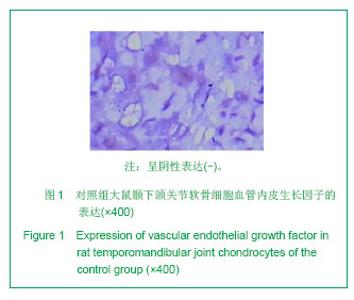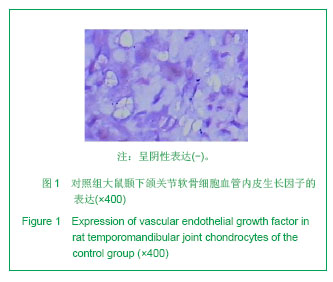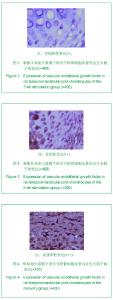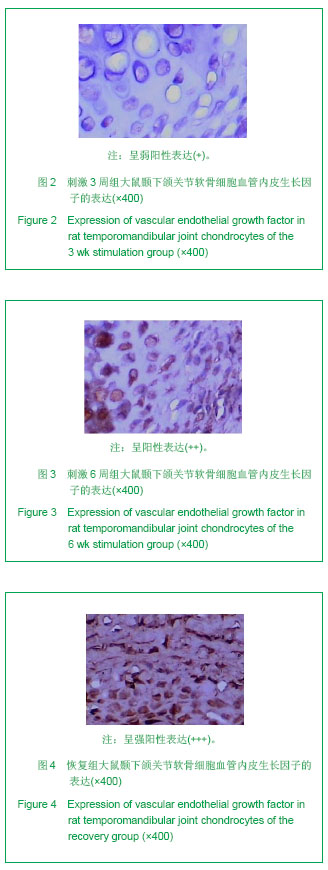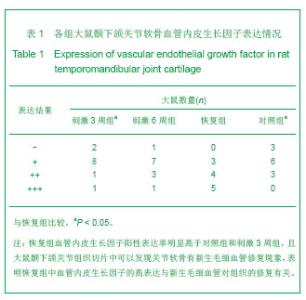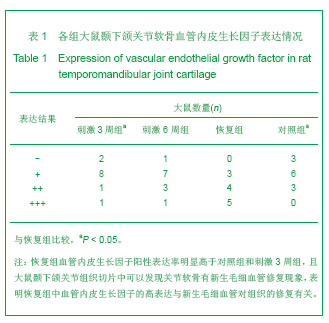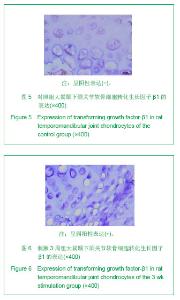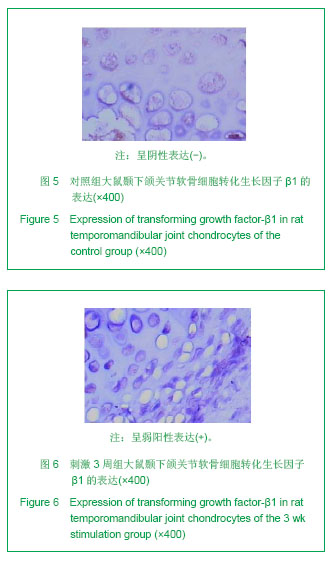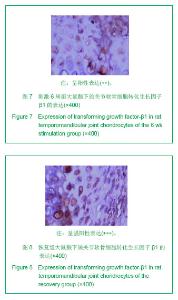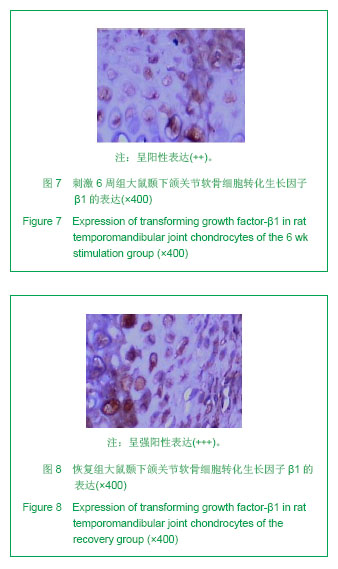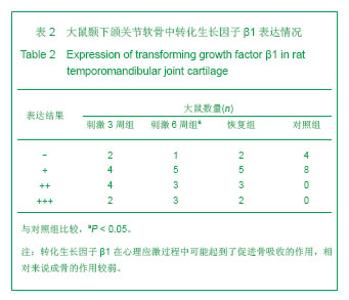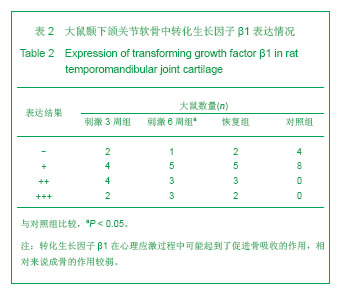Chinese Journal of Tissue Engineering Research ›› 2013, Vol. 17 ›› Issue (46): 8004-8011.doi: 10.3969/j.issn.2095-4344.2013.46.005
Previous Articles Next Articles
Psychological stress affects the expressions of two kinds of cytokines in rat temporomandibular joint cartilage
Huang Xu, Xiao Peng, Wang Yan, Zhang Hong-yu, Liu Hai-xia
- Department of Stomatology, the Second Affiliated Hospital of Xinjiang Medical University, Urumqi 830028, Xinjiang Uygur Autonomous Region, China
-
Online:2013-11-12Published:2013-11-30 -
Contact:Liu Hai-xia, M.D., Chief physician, Department of Stomatology, the Second Affiliated Hospital of Xinjiang Medical University, Urumqi 830028, Xinjiang Uygur Autonomous Region, China -
About author:Huang Xu★, Studying for master’s degree, Department of Stomatology, the Second Affiliated Hospital of Xinjiang Medical University, Urumqi 830028, Xinjiang Uygur Autonomous Region, China 718761685@qq.com -
Supported by:the National Natural Science Foundation of China, No. 81360169*
CLC Number:
Cite this article
Huang Xu, Xiao Peng, Wang Yan, Zhang Hong-yu, Liu Hai-xia. Psychological stress affects the expressions of two kinds of cytokines in rat temporomandibular joint cartilage[J]. Chinese Journal of Tissue Engineering Research, 2013, 17(46): 8004-8011.
share this article
| [1]Konstantinovi? VS, Lazi? V. Occlusion splint therapy in patients with craniomandibular disorders (CMD). J Craniofac Surg. 2006;17(3):572-578. [2]易新竹, 张晓歌, 王艳民. 颞下颌关节紊乱病咬合板治疗[J]. 中国实用口腔科杂志, 2009, 2(3):137-139. [3]Gavish A, Winocur E, Ventura YS,et al. Effect of stabilization splint therapy on pain during chewing in patients suffering from myofascial pain. J Oral Rehabil. 2002;29(12):1181-1186. [4]Schmale H, Bamberger C. A novel protein with strong homology to the tumor suppressor p53. Oncogene. 1997; 15(11):1363-1367. [5]马绪臣.颞下颌关节病的基础与临床 [M].2版.北京:人民卫生出版社,2004:3841,4347. [6]马绪臣,张震康.颞下颌关节紊乱病双轴诊断的临床意义和规范治疗的必要性[J].中华口腔医学杂志,2005,40(5):353-355. [7]肖朋,张丽,侯敏,等.心理应激对大鼠颞下颌关节组织结构的影响[J].科技导报, 2010, 28(10): 32-36. [8]Pohlers D, Brenmoehl J, Löffler I,et al.TGF-beta and fibrosis in different organs - molecular pathway imprints.Biochim Biophys Acta. 2009;1792(8):746-756. [9]Jacobs TW, Gown AM, Yaziji H,et al. Comparison of fluorescence in situ hybridization and immunohistochemistry for the evaluation of HER-2/neu in breast cancer.J Clin Oncol. 1999;17(7):1974-1982. [10]尚海燕,陈永进,郭照江.正确认识心理因素在颞颌关节紊乱病中的作用[J].医学与哲学:临床决策论坛版,2006,27(6):48-49. [11]李京佳,林相国,许涛,等.VEGF家族及其在肿瘤生长中作用的研究[J].现代生物医学进展,2012,12(4): 777-779. [12]杨庆秋,胡侦明,浦波,等.整合素αv β3和VEGF 在骨折愈合过程中的表达及意义[J].中国矫形外科杂志,2012,20(2):165-168. [13]谷化平,尚培中.EGFR、VEGF 和PTEN 在结直肠癌中表达及与其临床病理特征的关系[J].实用癌症杂志,2011,26(3):259-262. [14]Ferrara N, Davis-Smyth T. The biology of vascular endothelial growth factor. Endocr Rev. 1997;18(1):4-25. [15]Wagatsuma A. Endogenous expression of angiogenesis- related factors in response to muscle injury. Mol Cell Biochem. 2007;298(1-2):151-159. [16]Ylä-Herttuala S, Alitalo K. Gene transfer as a tool to induce therapeutic vascular growth. Nat Med. 2003;9(6):694-701. [17]Jo?ko J, Gwó?d? B, Jedrzejowska-Szypu?ka H,et al. Vascular endothelial growth factor (VEGF) and its effect on angiogenesis. Med Sci Monit. 2000;6(5):1047-1052. [18]Lebherz C, von Degenfeld G, Karl A,et al.Therapeutic angiogenesis/arteriogenesis in the chronic ischemic rabbit hindlimb: effect of venous basic fibroblast growth factor retroinfusion. Endothelium. 2003;10(4-5):257-265. [19]Affleck DG, Bull DA, Bailey SH,et al. PDGF(BB) increases myocardial production of VEGF: shift in VEGF mRNA splice variants after direct injection of bFGF, PDGF(BB), and PDGF(AB). J Surg Res. 2002;107(2):203-209. [20]Pugh CW, Ratcliffe PJ. Regulation of angiogenesis by hypoxia: role of the HIF system. Nat Med. 2003;9(6):677-684. [21]Ishibashi H, Shiratuchi T, Nakagawa K,et al. Hypoxia-induced angiogenesis of cultured human salivary gland carcinoma cells enhances vascular endothelial growth factor production and basic fibroblast growth factor release. Oral Oncol. 2001; 37(1):77-83. [22]Ziemer LS, Koch CJ, Maity A,et al. Hypoxia and VEGF mRNA expression in human tumors. Neoplasia. 2001;3(6):500-508. [23]Horner A, Bord S, Kelsall AW,et al. Tie2 ligands angiopoietin-1 and angiopoietin-2 are coexpressed with vascular endothelial cell growth factor in growing human bone. Bone. 2001;28(1):65-71. [24]Gerber HP, Vu TH, Ryan AM,et al. VEGF couples hypertrophic cartilage remodeling, ossification and angiogenesis during endochondral bone formation. Nat Med. 1999;5(6):623-628. [25]Ikeda M, Hosoda Y, Hirose S,et al. Expression of vascular endothelial growth factor isoforms and their receptors Flt-1, KDR, and neuropilin-1 in synovial tissues of rheumatoid arthritis. J Pathol. 2000;191(4):426-433. [26]Giatromanolaki A, Sivridis E, Athanassou N,et al.The angiogenic pathway "vascular endothelial growth factor/flk-1(KDR)-receptor" in rheumatoid arthritis and osteoarthritis. J Pathol. 2001;194(1):101-108. [27]Sato J, Segami N, Yoshitake Y,et al. Correlations of the expression of fibroblast growth factor-2, vascular endothelial growth factor, and their receptors with angiogenesis in synovial tissues from patients with internal derangement of the temporomandibular joint. J Dent Res. 2003;82(4): 272-277. [28]Dvorak HF, Brown LF, Detmar M,et al. Vascular permeability factor/vascular endothelial growth factor, microvascular hyperpermeability, and angiogenesis. Am J Pathol. 1995; 146(5):1029-1039. [29]Kubota E, Kubota T, Matsumoto J,et al. Synovial fluid cytokines and proteinases as markers of temporomandibular joint disease. J Oral Maxillofac Surg. 1998;56(2):192-198. [30]Takahashi T, Nagai H, Seki H,et al. Relationship between joint effusion, joint pain, and protein levels in joint lavage fluid of patients with internal derangement and osteoarthritis of the temporomandibular joint.J Oral Maxillofac Surg. 1999;57(10): 1187-1193. [31]Leonardi R, Lo Muzio L, Bernasconi G,et al. Expression of vascular endothelial growth factor in human dysfunctional temporomandibular joint discs. Arch Oral Biol. 2003;48(3): 185-192. [32]Gerber HP, Vu TH, Ryan AM,et al.VEGF couples hypertrophic cartilage remodeling, ossification and angiogenesis during endochondral bone formation. Nat Med. 1999;5(6):623-628. [33]Gleizes PE, Rifkin DB. Activation of latent TGF-beta. A required mechanism for vascular integrity. Pathol Biol (Paris). 1999;47(4):322-329. [34]Mehrara BJ, Rowe NM, Steinbrech DS,et al. Rat mandibular distraction osteogenesis: II. Molecular analysis of transforming growth factor beta-1 and osteocalcin gene expression. Plast Reconstr Surg. 1999;103(2):536-547. [35]张敏,李松,徐芸. 静压力对髁突软骨转化生长因子β1表达影响的体外研究[J]. 实用口腔医学杂志, 2006, 22(6): 775-778. [36]陈金武,王美青.转化生长因子β和关节软骨[J].国外医学:口腔医学分册,2000,27(6):376-379. [37]Boumediene K, Vivien D, Macro M,et al. Modulation of rabbit articular chondrocyte (RAC) proliferation by TGF-beta isoforms. Cell Prolif. 1995;28(4):221-234. [38]常嘉,马绪臣,马大龙,等.颞下颌关节骨关节病髁突软骨细胞及基质合成代谢特性的研究[J].中华口腔医学杂志,2004,39(4):309-312. [39]赵伟,王美青.血管内皮生长因子及其受体在大鼠下颌骨髁突软骨细胞中的表达和意义[J]. 牙体牙髓牙周病学杂志,2004, 14(9): 494-496. [40]Mehrara BJ, Rowe NM, Steinbrech DS,et al. Rat mandibular distraction osteogenesis: II. Molecular analysis of transforming growth factor beta-1 and osteocalcin gene expression. Plast Reconstr Surg. 1999;103(2):536-547. [41]李小兵,罗颂椒,张世羽. 功能矫形前伸大鼠下颌后髁突软骨β转化生长因子-1(TGF-β1)表达变化的研究[J].华西口腔医学杂志, 1998, 16(4): 352-354. [42]Baylink DJ, Finkelman RD, Mohan S. Growth factors to stimulate bone formation. J Bone Miner Res. 1993;8 Suppl 2:S565-572. [43]张敏,李松,徐芸. 静压力对髁突软骨转化生长因子β1表达影响的体外研究[J]. 实用口腔医学杂志, 2006, 22(6): 775-778. [44]裴明,曲绵域,于长隆,等. 碱性成纤维细胞生长因子和转化生长因子β1在人发育骨与软骨中的表达及意义[J]. 中国运动医学杂志, 2000, 19(2): 120-121. [45]Joyce ME, Jingushi S, Bolander ME. Transforming growth factor-beta in the regulation of fracture repair. Orthop Clin North Am. 1990;21(1):199-209. [46]Cornell CN, Lane JM. Newest factors in fracture healing. Clin Orthop Relat Res. 1992;(277):297-311. [47]Pujol JP, Galera P, Redini F,et al. Role of cytokines in osteoarthritis: comparative effects of interleukin 1 and transforming growth factor-beta on cultured rabbit articular chondrocytes. J Rheumatol Suppl. 1991;27:76-79. [48]van Beuningen HM, van der Kraan PM, Arntz OJ,et al. Transforming growth factor-beta 1 stimulates articular chondrocyte proteoglycan synthesis and induces osteophyte formation in the murine knee joint.Lab Invest. 1994;71(2): 279-290. [49]Kafas P, Leeson R. Assessment of pain in temporomandibular disorders: the bio-psychosocial complexity. Int J Oral Maxillofac Surg. 2006;35(2):145-149. [50]林成,刘宝林,刘彦普,等. VEGF和TGF-β1促进非血管化骨移植同期种植骨结合的实验研究[J]. 实用口腔医学杂志, 2011, 27(1): 12-16. |
| [1] | Liu Yafei, Wang Yalin, Zuo Yanping, Sun Qi, Wei Jing, Zhao Lixia. Structural changes of the temporomandibular joint in adolescents with skeletal Class III malocclusions after maxillary protraction: an X-ray measurement analysis [J]. Chinese Journal of Tissue Engineering Research, 2021, 25(8): 1154-1159. |
| [2] | Wu Xun, Meng Juanhong, Zhang Jianyun, Wang Liang. Concentrated growth factors in the repair of a full-thickness condylar cartilage defect in a rabbit [J]. Chinese Journal of Tissue Engineering Research, 2021, 25(8): 1166-1171. |
| [3] | Gao Liping, Wan Lu, Zeng Manman, Li Xiaobing, Zhong Wenyi. Effects of maxillary expansion on temporomandibular joint and airway in children [J]. Chinese Journal of Tissue Engineering Research, 2021, 25(35): 5723-5728. |
| [4] | Wang Yifei, Song Yang, Guan Yongge, Xu Chunyan. Bone marrow mesenchymal stem cell transplantation in a rat model of thin endometrium based on HOXA10 regulatory network [J]. Chinese Journal of Tissue Engineering Research, 2019, 23(9): 1397-1402. |
| [5] | Gao Kun1, Zhu Wenxiu2, Li Heng1, Liu Weidong1, Li Quan1, Yu Weiji1, Wang Lixin1, Cao Yafei1. Exosomes in serum of ovariectomized rats promote primary osteoblast proliferation [J]. Chinese Journal of Tissue Engineering Research, 2019, 23(7): 958-989. |
| [6] | Wu Min1, Li Xue1, Gao Jie1, Yang Shuai1, Cai Yizhi2, Wang Mingguo1 . Micro-CT changes and vascular endothelial growth factor expression in reconstructed mandibular condylar cartilage under continuous mandibular advancement in growing and adult rats [J]. Chinese Journal of Tissue Engineering Research, 2019, 23(7): 1001-1006. |
| [7] | Hu Liang1, Wang Junhai1, Wang Zhilie1, Xie Jinyuan1, Chen Deng1, Ding Fan2. Vascular endothelial growth factor combined with mutant hypoxia-inducible factor 1alpha promotes angiogenesis [J]. Chinese Journal of Tissue Engineering Research, 2019, 23(3): 378-383. |
| [8] | Hu Juan, Yao Zhitao, Wang Shan, Huate•Hadeer, Maimaitituxun•Tuerdi. Recombinant human bone morphogenetic protein 2 promotes osteogenic differentiation of bone marrow mesenchymal stem cells from intracapsular condylar fracture goats [J]. Chinese Journal of Tissue Engineering Research, 2019, 23(29): 4610-4616. |
| [9] | Yu Hedong, Chen Yongji, Mao Min, Chen Shaojuan, Ni Xiaobing, Leng Weidong, Luo Jie. Polyetheretherketone/biphasic bioceramic composite coated with vascular endothelial growth factor to repair mandibular defects [J]. Chinese Journal of Tissue Engineering Research, 2019, 23(2): 184-189. |
| [10] | Chen Haitao, An Yuguang. Efficacy of specific versus non-specific cyclooxygenase-2 inhibitors in the healing of rabbit models of tibial fractures [J]. Chinese Journal of Tissue Engineering Research, 2019, 23(15): 2385-2390. |
| [11] | Wang Yuxuan. Combination of resveratrol and fetal liver stem cell transplantation for treatment of liver cirrhosis in rats [J]. Chinese Journal of Tissue Engineering Research, 2019, 23(13): 2049-2054. |
| [12] | Peng Qiufeng, Gao Jingzhen, Ye Kui, Xing Aimin. Transplantation of endothelial progenitor cells with RNA interference targeting transforming growth factor beta1 inhibits pulmonary fibrosis in rats [J]. Chinese Journal of Tissue Engineering Research, 2019, 23(1): 90-95. |
| [13] | Zhang Tie-hui, Liang Wu, Ren Yuan-fei, Dong Yu-jin, Yang Wen-feng, Shang Yao-hua, Li Ju-tao, Zhong Sheng. Application of microsutures with vascular endothelial growth factor to improve vascular endothelial regeneration after small vessel anastomosis in the rats [J]. Chinese Journal of Tissue Engineering Research, 2018, 22(6): 877-882. |
| [14] | Yang Lei1, Gao Lei2, Wang Lei2, Zuo You-wei2, Liu Yan-ling2, Wang Jiang-ning2. Enhancement-perfusion therapy by extracorporeal circulation system ameliorates the blood supply of ischemic lower limbs [J]. Chinese Journal of Tissue Engineering Research, 2018, 22(4): 553-557. |
| [15] | Gu Shaodong, Zhou Yun, Xiong Qianwei, Zhang Ya, Yang Jinlong. Bladder acellular matrix combined with vascular endothelial growth factor repairs rabbit urethral defects [J]. Chinese Journal of Tissue Engineering Research, 2018, 22(34): 5477-5483. |
| Viewed | ||||||
|
Full text |
|
|||||
|
Abstract |
|
|||||
